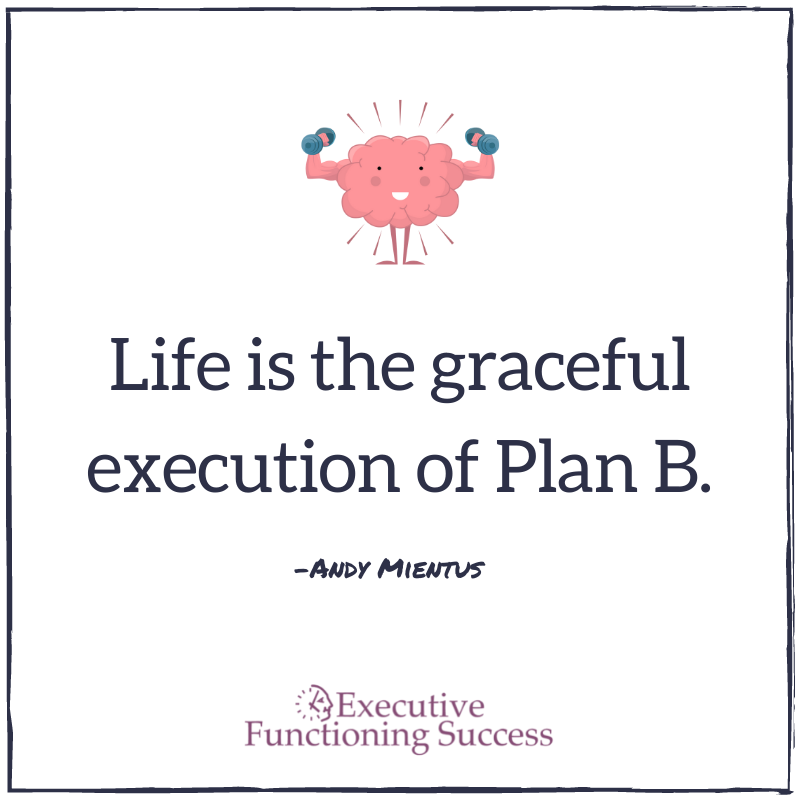Two key aspects of executive functioning are the ability to think into the future, and to take action to make plans happen.
I’ve been struggling (for more years than I care to admit) with a critical bit of future thinking: a plan for what to do with my business, Executive Functioning Success.
As many of you know, I’ve put my heart and soul into EFS for the past twelve years, plus fifteen years of prior effort creating the Seeing My Time™ program. It has been such a journey – and a surprising one.
When I look back at young Marydee, who described herself as an “underachieving procrastinator”, I’m astounded by the myriad of ways that both the business and I have grown. When I published the Seeing My Time™ books back in 2010, I never imagined that I would become a business owner. And I certainly never thought I’d be concerned with the issue of having a succession plan for a thriving business that reaches around the world.
In my kitchen the other day, I was telling my husband of almost 40 years that I never envisioned myself running a business, to which he replied, “Neither did I.”
I was always the educator and the reluctant entrepreneur as I pressed forward sharing Seeing My Time™. People kept asking for more and I pushed myself to meet their needs. We receive daily positive feedback from the people we have touched at EFS via our courses and products. Their comments, spoken from their hearts, inspire the EFS team to continue our mission of ending the pain caused by poor executive functioning.
And here I am now, nearing 69 years of age. I am keenly aware of limited lifetimes. I’ve outlived my mother by 18 years and my father by 8 years. I love my work, my business, my team, the people whose lives have touched mine. And I know that I will not live forever. My aging mind and body are forcing me to slow down, limit demands and look mortality straight in the face, which is not something I, nor anyone else, especially wants to do!
Anxieties Hiding in Plain Sight
For those who have not read my blog last month on the topic of grief and executive functions, I’ve been buffeted by deaths recently.
Grief, and my responses to it, became the topic of a recent counseling session. My wise therapist helped me sort through my feelings.
And then, just before the end of our hour, I choked up and said, “And I am grieving the future loss of my business, my work. I have to let it go too.” At this she nodded her head, and said something like, “Ahh. Here is the real issue for you.” Yup. Bingo. Time to deal with it. As we set up our next appointment, she gave me this task: “Don’t put yourself into an all or nothing mindset. Imagine lots of options and we can talk about them next time.”
For years, I’ve been seeking advice on succession planning from various business advisors. I never imagined that my counselor would be the one who would ultimately help me! She is actually the perfect person: my therapist is older than me by a few years and loves her work. She isn’t working for the money. Instead, she is working for the purpose and satisfaction it gives her life. Our motives and desires are similar and, like her, I want to stay connected to my work for as long as possible.
Scheduling that next appointment with her gave me a critical deadline coupled with the accountability I needed. The following day, I was to have an in-person EFS team meeting, the first in two years. This was an additional incentive to push through my reluctance and resistance. And I did it! I came up with five options for the future, each building in flexibility for the vagaries of life.
When I presented the options to my most beloved (and younger) team, they brought tears to my eyes as they expressed their commitment to continue to build this company’s outreach to help others as I pedal back my involvement over the next few years.
With this flexible plan and their enthusiasm, I suddenly felt so much lighter, and dare I say, younger, than I have in years. I find myself being excited and inspired to play more with EFS. I’ve got plans to pursue!
Hiding from Scary Future-connected Tasks that Need your Attention?
 Try these steps to get past the stuck point and encourage future thinking.
Try these steps to get past the stuck point and encourage future thinking.
- Reach out to a trusted mentor to hold you accountable and help you analyze options.
- Consider multiple scenarios and outcomes. Flexibility is key as nothing is certain.
- Examine your human resources for individuals who can help you implement your plan.
- Pick the most exciting, and perhaps daring plan to focus on. Give yourself a deadline at which you will evaluate your results. The deadline could be a year or more away.
- If the number one plan is paying off, celebrate and keep creating and following new plans.
- If the exciting plan isn’t working out like you’d hoped, it is time to choose a new option, your next plan. “Life is the graceful execution of Plan B!” And sometimes C and D and E and…
Don’t be afraid of the future. Make some plans. Take the little steps to get rolling on that plan. Have courage! You might just find yourself feeling a whole lot better, maybe even younger.
Little by little…
Marydee
PS: My dream for the next couple of years is about sharing my insights and experiences in a mentoring program for professionals who work with executive function-challenged people. This dream is just taking shape and we’d love your thoughts about it! If you are interested, please sign up to receive more information.

